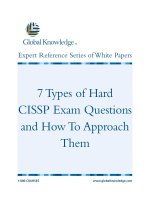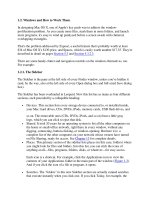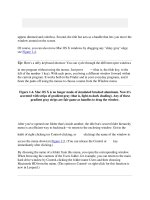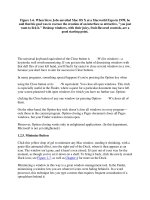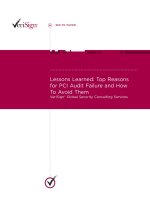Your forces and how to use them ebook
Bạn đang xem bản rút gọn của tài liệu. Xem và tải ngay bản đầy đủ của tài liệu tại đây (6.6 MB, 880 trang )
Your Forces and How to
Use Them
Y F H U T
Writings
The White Cross Library
Your Forces and How to Use em Volume I, May –May
Your Forces and How to Use em Volume II, May –May
e Swamp Angel
Your Forces and How to Use em Volume III, May –May
Prentice Mulford’s Story—Life by Land and Sea
Your Forces and How to Use em Volume IV, May –May
Your Forces and How to Use em Volume V, May –May
Your Forces and How to Use em Volume VI, May –May
Your Forces and How to
Use Them
T W C L
May 1886–May 1892
Prentice Mulford
1834–1891
信
YOGB: H, MO
:::::
Y F H U T
Copyright
YOGeBooks by Roger L. Cole, Hollister, MO
© YOGeBooks by Roger L. Cole
All rights reserved. Electronic edition published
: ---- ()
: ---- ()
www.yogebooks.com
Contents
V I.
M –M
I. You Travel When You Sleep.
II. Where You Travel When You Sleep.
III. e Art of Forgetting.
IV. How oughts are Born.
V. e Law of Success.
VI. How to Keep Your Strength.
VII Consider the Lilies.
VIII. e Art of Study.
IX. Profit and Loss in Associates.
X. e Slavery of Fear.
XI. What are Spiritual Gifts?
XII. e Process of Re-Embodiment.
XIII. Re-Embodiment Universal in Nature.
V II.
M –M
I. Some Laws of Health and Beauty.
Y F H U T
II. Mental Intemperance.
III. e Law of Marriage.
IV. e God in Yourself.
V. Force, and How to Get It.
VI. e Doctor Within.
VII Co-Operation of ought.
VIII. e Religion of Dress.
IX. e Necessity of Riches.
X. Use Your Riches.
XI. e Healing and Renewing Force of Spring.
XII. Positive and Negative ought.
V III.
M –M
I. e Practical Use of Reverie.
II. Your Two Memories.
III. Self-Teaching: or, the Art of Learning How to Learn.
IV. How to Push Your Business.
V. e Religion of the Drama.
VI. Voice of the Mountain.
VII e Uses of Sickness.
VIII. Who Are Our Relations?
IX. e Use of a Room.
X. Husband and Wife.
XI. A Cure for Alcoholic Intemperance through the Law of
Demand.
XII. e Mystery of Sleep, or Our Double Existence.
XIII. e Church of Silent Demand.
V IV.
M –M
I. e Drawing Power of Mind.
II. e Use of Sunday.
C
III. Grace Before Meat; or, e Science of Eating.
IV. e Source of Your Strength.
V. What We Need Strength For.
VI. One Way to Cultivate Courage.
VII e Material Mind vs. e Spiritual Mind.
VIII. Marriage and Resurrection.
IX. Immortality in the Flesh.
X. Faith; or, Being Led of the Spirit.
XI. Some Practical Mental Recipes.
XII. e Use and Necessity of Recreation.
V V.
M –M
I. Mental Tyranny, or How We Mesmerize Each Other.
II. Spells, or the Law of Change.
III. Look Forward!
IV. ought Currents.
V. Healthy and Unhealthy Spirit Communion.
VI. Uses of Diversion.
VII Regeneration: or, Being Born Again.
VIII. “Lies Breed Disease: Truths Bring Health.”
IX. God’s Commands are Man’s Demands.
X. About Economizing Our Forces.
XI. God in the Trees; or, the Infinite Mind in Nature.
XII. What is Justice?
V VI.
M –M
I. Woman’s Real Power.
II. Love yself.
III. About Prentice Mulford.
IV. Mental Medicine.
V. Prayer in All Ages.
Y F H U T
VI. e Attraction of Aspiration.
VII Cultivate Repose.
VIII. Good and Ill Eects of ought.
IX. Buried Talents.
X. e Power of Honesty.
XI. Confession.
XII. e Accession of New ought.
God.
A
S Power and Wisdom governs the Universe. e
Supreme Mind is measureless, and pervades endless
space. e Supreme Wisdom, Power and Intelligence is
in everything that exists from the atom to the planet.
e Supreme Power and Wisdom is more than in everything.
e Supreme Mind is everything. e Supreme Mind is every
atom of the mountain, the sea, the tree, the bird, the animal, the
man, the woman. e Supreme Wisdom cannot be understood
by man or by beings superior to man. But man will gladly
receive the Supreme thought and wisdom, and let it work for
happiness through him, caring not to fathom its mystery.
e Supreme Power has us in its charge, as it has the suns
and endless systems of worlds in space. As we grow more to
recognize this sublime and exhaustless wisdom, we shall learn
more and more to demand that wisdom draw it to ourselves,
make it a part of ourselves, and thereby be ever making
ourselves newer and newer. is means ever perfecting health,
greater and greater power to enjoy all that exists, gradual
transition into a higher state of being and the development of
powers we do not now realize as belonging to us.
We are the limited yet ever growing parts and expressions
of the Supreme Never Ending Whole. It is the destiny of all in
Y F H U T
time to see their relation to the Supreme and also to see that
the straight and narrow path to ever-increasing happiness is a
perfect trust and dependence on the Supreme for the all round
symmetrical wisdom and idea which we individually cannot
originate. Let us then daily demand faith, for faith is power to
believe and power to see that all things are parts of the Infinite
Spirit of God, that all things have good or God in them, and
that all things when recognized by us as parts of God must
work for our good.
Your Forces and How to
Use Them
Y F H U T
Volume I.
May 1886–May 1887
Y F H U T
I.
You Travel When You Sleep.
oughts are ings.
Y
travel when your body is in the state called sleep. e
real “you” is not your body; it is an unseen organization,
your spirit. It has senses like those of the body, but far
superior. It can see forms and hear voices miles away from the
body. Your spirit is not in your body. It never was wholly in it; it
acts on it and uses it as an instrument. It is a power which can
make itself felt miles from your body.
One-half of our life is a blank to us; that is, the life of our spirit
when it leaves the body at night. It goes then to countries far
distant, and sees people we never know in the flesh.
Sleep is a process, unconsciously performed, of
self-mesmerism. As the mesmeric operator wills another into
unconsciousness, so do you nightly will yourself, or rather your
body, into a state of insensibility.
What the mesmeric operator really does is to draw the spirit
out of the body of the person he mesmerizes. He brings the
thought of his subject to some focus or centre, as a coin held
in the hand. While thus centred, the thought (or spirit) of the
subject is put in such a condition that he can most easily aect
Y F H U T
it by his will. He wills then the person’s spirit out of his body.
is done, he throws his own thought in that body. It is then
as a house left open by its owner. e mesmerizer then takes
possession of that body by the power of his own thought. It is
not the subject at all who sees, feels, and tastes as the operator
wills: it is the spirit or thought of the mesmerizer himself,
exercised in another body, temporarily left vacant by its own
spirit.
ought is a substance as much as air or any other unseen
element of which chemistry makes us aware. It is of many and
varying degrees in strength.
Strong thought or mind is the same as strong will. Some
persons are so weak in thought, as compared with the practised
mesmerizer, that they cannot resist him. Others of even stronger
thought can give themselves up voluntarily to his control. You
need not be overpowered by anyone in this way, providing you
resist them in mind, and call upon the higher power to assist
you, if you feel their thought overcoming you.
When we “go to sleep,” the spirit has been by its day’s
workings sent widely scattered away from the body; with so
little of its force left by it, the body falls into the trance state
of slumber. As the mesmerizer draws the spirit away from the
body of his subject, so has our spirit drawn itself away from our
bodies by its many eorts during the day.
Your body is not your real self. e power that moves it as
you will is your spirit. at is an invisible organization, quite
distinct and apart from your body. Your spirit (your real self)
uses your body as the carpenter does his hammer or any tool
to work with.
It is the spirit that is tired at night. It is exhausted of its force,
and therefore not able to use the body vigorously. e body is
really then as strong as ever, as the carpenter’s hammer has the
same strength when his arm is too weak to use it.
e spirit is weak at night, because its forces have in thought
been sent in so many dierent directions during the day that it
Y T W Y S
cannot call them together. Every thought is one of these forces,
and a part of your spirit. Every thought, spoken or unspoken, is
a thing, a substance, as real, though invisible, as water or metal.
Every thought, though unspoken, is something which goes to
that person, thing, or locality on which it is placed. Your spirit,
then, has during the day been so sent in a thousand, perhaps
ten thousand, dierent directions. When you think, you
work. Every thought represents an outlay of force. So sending
out force for sixteen or eighteen hours, there is not at night
sucient left in or near the body to use it. e body therefore
falls into the condition of insensibility we call sleep. During this
condition the spirit collects its scattered forces, its thoughts
which have been sent far and wide; it returns with its powers
so concentrated to the body, and again possesses it with its full
strength. It is when scattered as so many scattered rills of water
trickling in many directions. Put all these together in a single
volume, and you have the power that turns the mill-wheel.
Could you call all of your spirit at once to its centre, and
so collect its widely scattered forces, you could be fresh and
strong in as many minutes as it now takes hours to rest you.
is power was known to the first Napoleon, and sustained him
for days with very little sleep during the crisis of his campaigns
when his energies were taxed to the utmost. It is a power which
can be acquired by all through a certain training.
It is done by first placing the body in a state of as complete
rest as possible; stopping all involuntary physical motions, such
as the swinging of limbs, tapping with the foot, or drumming
with the fingers. All such involuntary movements waste your
force, and, worse, train you unconsciously to a habit hard to
break, of wasting force. e involuntary working of the mind,
the straying of thought in every direction,—towards persons,
things, plans, and projects,—the useless frettings over cares
great and small, must be similarly stopped, and the mind for a
few minutes made as near a blank as possible. Concentration
of thought on the word “in-drawing,” or “drawing into self,” or
Y F H U T
the mind-picture of your spirit with its fine electric filaments
reaching to persons, places, and things far from you, being
all drawn back, and massed in a focus, is a help to do this;
because whatso you image in your mind is a spiritual reality.
at is, what you image, you are actually in spirit and by spirit
doing. Every plan or invention clearly seen in thought is of
thought-substance, as real a thing as the wood, stone, iron, or
other substance in which afterward it may be embodied and
made visible to the body’s eye, and made to work results on the
physical stratum of life.
If a man thinks murder, he actually puts out an element of
murder in the air. He sends from him a plan of murder as real as
if drawn on paper; its thought is absorbed by others; so is this
element and unseen plan of murder absorbed by other minds; it
inclines them towards violence if not murder. If a person is ever
thinking of sickness, he sends from him the element of sickness;
if he thinks of health, strength, and cheerfulness, he sends from
him constructions of thought aecting others to health and
strength as well as himself. A man sends from him in thought
what he (his spirit) is most built of. “As a man thinketh, so is he.”
Your spirit is a bundle of thought; what you think most of, that
is your spirit. Imagine, then, yourself as such a being, drawing in
all these filaments, sent and placed as they are to so many things.
e thoughts so passing from you in one minute could hardly
be plainly written out in an hour. You gather them to a centre.
You have then gathered in and concentrated your full motive
power; then you can put all its force on any thing you please.
When the eye and mind are put on any single object that does
not tax the energies, say a spot in the wall, the positive thought
or filaments reaching out are drawn in to the common centre.
Your absorption on any single thing loosens them from their
near or far point of contact. Before such loosening, the spirit is
as the expanded hand and fingers. When the thought is drawn
in, the spirit is as the closed or clinched fist.
Y T W Y S
When thought is sent out to any thing, you send out your
force. When it is centred in a single thing, and so drawn in and
kept from straying every moment, you are drawing in force.
e Hindoo “adept” becomes able, through a certain training
of mind, to send his spirit or himself from his body. It is still
connected with it by the fine unseen current of life known in
the Bible as the “silver thread.” When that thread is snapped,
body and spirit are completely severed, and the body dies. e
“adept” has allowed himself to be buried alive. Rice has been
sown over his grave, and sprouted. Seals were put in his con,
and the grave carefully watched. He has so remained for weeks,
and when dug up “came to life.”
e real man was never buried at all. It was only his body
in the self-induced trance state, that was buried. Between his
body and spirit, possibly miles away, the fine thread of spirit
kept up the body’s life, or rather such supply of life as the body
needed to keep it from decay. When the body was dug up, his
spirit returned, and took full possession of it. He was able to do
with his own body what the mesmerizer does with the body
of his subject. He sent his own spirit out of it; the mesmerizer
sent his subject’s spirit out. Before so sending out his spirit, the
adept makes his mind a blank. Before drawing out the spirit of
his subject, the operator causes the subject to make his own
mind a blank; in other words, he stops the resisting forces of the
other person’s thought by turning all his thought to a centre.
Your spirit can, and does frequently, go from your body to
other places during sleep. It is then still connected with it by
this thread of exceedingly fine element. is can be drawn out
to a great distance. It is as an expanding or contracting electric
wire connecting your spirit with the instrument it operates,
your body.
is power of the spirit so to leave the body accounts for the
phenomenon of persons being seen in two places far distant at
the same time. It is the spirit that is seen by some clairvoyant
eye. It is the “double,” the “doppel ganger” of the German, the
Y F H U T
“wraith” of the Scotch. e spirit may even be far from the body
just previous to the body’s death. It is only the feeble supply
of life sent it through the connecting thread, which causes the
involuntary throes (so called) of dissolution. ese are not as
painful as they seem. e real self, the spirit, even then may be
unaware of the “death-bed scene.” It may go to some person,
possibly at a distance, to whom it is much attracted; and
thereby is solved the mystery of the apparitions, seen by distant
friends, of persons whose deaths at or about the time of such
appearances were not heard of until months after.
Sometimes people, during periods of sickness, fall
unconsciously into a state where the spirit leaves the body,
without snapping the threads of life. e body’s trance has then
been mistaken for its real death, and it (the body) has been
buried alive. e spirit has been compelled to return to its body
in the con. e thread could only be severed after such return.
Your real being is ever sending out, with each thought, a fine
electric ray or filament, representing so much of your life, your
force, your vitality, and reaching to the object, place, or person
to which such thought is sent, be it six feet or thousands of
miles from your body.
Your thought is your real strength. When you lift a weight,
you put your thought on the muscle that lifts. e heavier the
weight, the more of your thought do you put on it. If, in so
lifting, a part of your thought is turned in some other direction,
if some one talks to you, if something frightens or annoys you, a
part of your strength or thought leaves you. It goes to whatever
has taken away a part of your attention from lifting.
It is mind, thought, spirit, that use the muscle to lift, as we
use a rope to pull up a weight. ere is no lifting or working
without intelligence. Intelligence, thought, mind, and spirit
mean about the same thing.
It does not matter, in order to give strength, whether the spirit,
when once called together, be near the body or at a distance
from it. So that it brings its forces (its thoughts) together, be it
Y T W Y S
far from its body or near it, it is strong; and when it again takes
possession of your body, and wakes it up, it is able to use the
body with its full strength.
But the spirit may remain scattered all night. It may never be
able to bring its forces together at any time. It may be living, as
many now are, with its thought always in advance of the act it
is now doing or trying to do. It is walking the body and sending
out its force (its thought) to the place it hurries to. It is writing
with the body, and thinking of something else. When it frets,
it sends out force to the thing fretted about. ese states of
mind, acts of thought, and useless waste of force become at
last so confirmed in habit, that the spirit may lose all power
of bringing all its strength together. In this state it gathers no
strength by night or day.
Sleeplessness comes of the diculty of the spirit to bring
itself to a centre and collect its forces. Insanity comes of the
total inability of the spirit to focus its thoughts. e permanent
cure for sleeplessness must commence in the daytime. You
must drill your mind to put its whole thought on the act you
are now doing. If you tie your shoe, think shoe and nothing else.
en you bring yourself to a centre, and collect your forces. If
you tie your shoe, and think of what you are going to buy the
next hour, you are sending needlessly half of your force from
yourself. You are in reality trying to do two things at once. You
do neither well. You are scattering your spirit on as many things
as you think of while tying the shoe. You are cultivating the
bad habit of scattering your force, until such habit becomes
involuntary. You are making it more and more dicult for
your spirit to collect itself together. By so doing, you make it
more dicult for the spirit to return with strength to its body
in the morning, or to leave it at night. You can get no healthy
sleep at night unless your spirit does withdraw from its body.
Sleeplessness means simply that your spirit cannot leave its
body.
Y F H U T
If you fall into the dangerous habit of fretting, your spirit may
fret as much on going from its body at night as when using it in
the daytime. Or, if you are of a quarrelsome disposition, it may
be quarrelling, fighting, and hating all night, and so return to its
body without any strength to use it; because all quarrelling, if
only in thought, is constantly using up force.
It is for this very reason dangerous and unhealthy to let the
“sun go down on your wrath;” that is, to have in mind, just before
the body’s eyes close in sleep, the recollection of the persons
you dislike, and be then engaged in sending hating thought
to them. e spirit will keep up the process after it leaves the
body. To hate is simply to expend force in tearing yourself,
your spirit, to pieces. Hate is a destructive force. Good-will
to all is constructive: it builds you up stronger and stronger.
Hate tears you down. Good-will to all draws to you healthy
and constructive elements from all with whom you come in
contact. Could you see the actual elements as they flow from
them to you, in their liking for you, you would see them as fine
rills of life feeding yours. Could you see the contrary elements
of hatred which you may excite in others, you would see them
flowing toward you as dark rays or rills of dangerous, poisonous
substance. If you send out to it its like, the thought of hatred,
you only add to the unhealthy force and power of that element,
because these two opposed and dangerous elements meet and
mingle, act and re-act on those who send them, ever calling on
each to send fresh supply of force to keep up the war, until both
are exhausted. Self-interest should prompt people to hate none.
It weakens the body, and causes disease. You never saw a healthy
cynic, growler, or grumbler. eir soured thought poisons them.
eir bodily disease originates in their minds. eir spirits are
sick. at makes the body sick. All disease originates in this
way. Cure the spirit, change the state of the mind, replace the
desire to make others feel disagreeably by that of making them
feel agreeably, and you are on the road to cure disease. When
the spirit originates no warring, hating, gloomy, despondent
Y T W Y S
thought, no manner of unpleasant thought, the body will take
no disease whatever.
You can only oppose successfully the hatred or evil thought
of others by throwing out toward it the thought of good-will.
Good-will as a thought-element is more powerful than the
thought of hate. It can turn it aside. e “shafts of malice,”
even in thought, are real things. ey can and do hurt people
on whom they are directed, and make them sick. e Christ
precept, “Do good to them that hate you,” is based on a scientific
law. It means that thoughts are things, and that the thought of
good can always overpower that of evil. By power is here meant
power in as literal a sense as in speaking of the force that lifts a
table or chair. e fact that all thought, all emotion, all of what
is called sentiment, or qualities such as mercy, patience, love,
etc., are elements as real as any we see, is the cornerstone to the
scientific basis of religion.
What you call dreams are realities. Your spirit away from your
body at night goes to and sees persons and places. To some of
these you may have never gone with your body. You remember
on the body’s awakening very little of what you have seen. What
you do remember is mixed pell-mell together. at is because
your memory of the body can hold but a little of what is
grasped by the memory of your spirit. You have two memories,
one trained and adapted to the life of your body, the other of
your spirit. Had you known of the life and power of your spirit
from infancy, and recognized it as a reality, the memory of your
spirit would have been so trained that it would remember all
of its own life and bring it back to you on the awakening of the
body. But as you have been taught to regard even your spirit
as a myth, so you make of its memory a myth. Were a human
being taught from infancy to discredit the evidence of any of its
senses, then that sense would be blunted and almost destroyed.
Let all associated with a child for years deliberately set to work
and tell it that they could not see the sky or houses, fields, or
other familiar objects at hand; and with none allowed to break
Y F H U T
the delusion, that child’s eyesight as well as its judgment would
be seriously aected. We are similarly taught to deny all the
senses and powers of our spirits; or, rather, the real powers of
ourselves, of which the senses of the body are a faint counterpart,
are persistently denied. Substantially we are taught that we are
nothing but bodies. is is equivalent to telling the carpenter
that he is nothing but the hammer he uses.
If in a so-called dream you see a person who died years ago,
you see simply a person whose body, being worn out, could no
longer be used by him on this stratum of life.


